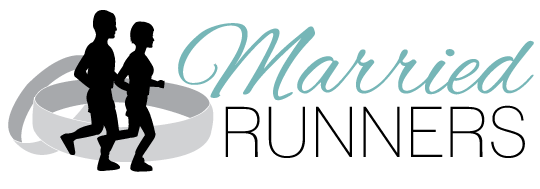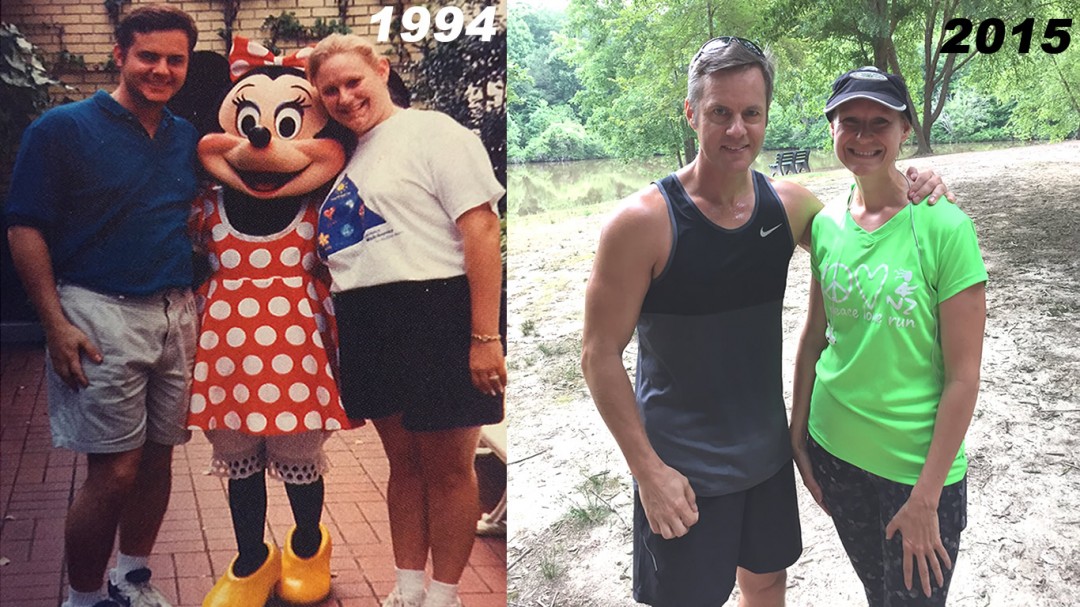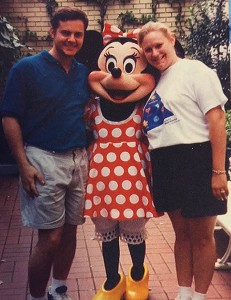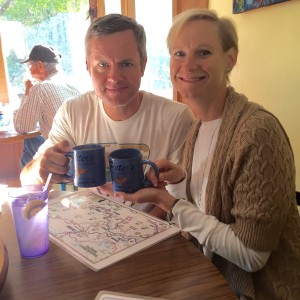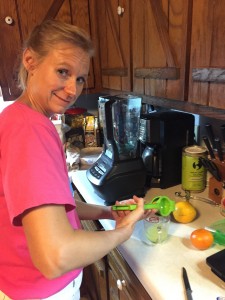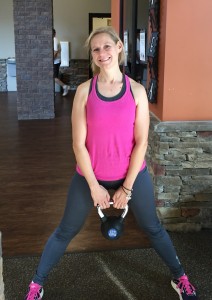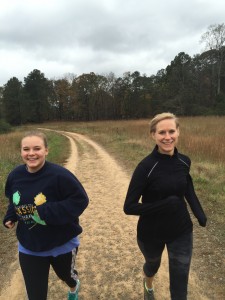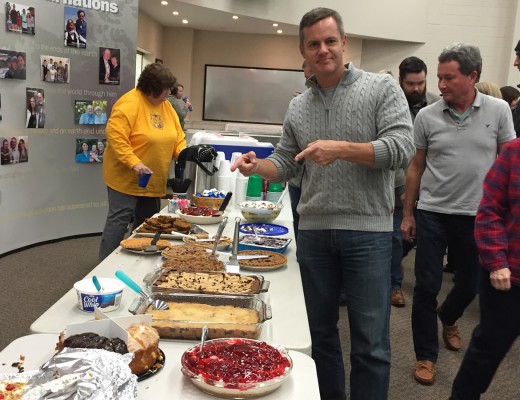Exercise or Diet – Which is More Important for Weight Loss?
You’re reading this because you and/or a loved one wants to lose weight. Let’s get right down to it, both diet and exercise are needed for safe, effective, sustainable weight loss. The old adage “eat less, move more” is as true today as it always has been. You already knew that, didn’t you? Society has a way of taking something so simple and making it overly complex. Yes, there is an officially sanctioned “position statement” from the American College of Sports Medicine that lays out the ideal plan for weight loss according to science and medical doctors. Unless you want to read all of the medical jargon, we’ll keep it simple in this article. Let’s de-mystify the subject of weight loss.
Warning – you are going to hear and read conflicting information about weight loss. We know how you might be feeling, because we’ve struggled with weight loss most of our adult lives. When we got married back in 1994, we were both overweight. Do you want to know the secret to our weight loss? There isn’t one! Don’t let anyone tell you there is a secret diet, exercise regimen, supplement, or technique to weight loss – there’s not. It really comes down to common sense and what works for you.
Disclosure – Neither Mary Catherine or Joe is trying to sell you anything. This is a non-commercial, non-profit blog. We are NOT selling vitamins, training sessions, consultations, diet pills, books, exercise equipment, or other products. There is no profit motive here, just the genuine desire to help. There are lots of excellent resources, trainers, and products out there to help, but you’ll need to use your own discernment and common-sense to find what works for you. Pro tip: avoid any so-called expert who tells you that there’s only one way to weight loss – no matter how credentialed they may be.
Weight Loss As a Journey
We like to think of weight loss as a journey towards healthier living, not a destination or single goal to be achieved. The picture at the top of this article shows us during our Honeymoon in 1994 and again just a few months ago – notice anything different? During our journey, there were times we thought we’d “arrived” at our destination, only to fall into old habits and regain weight. In a future article we’ll explore how to get back on the fitness wagon, when you’ve fallen off. During your journey your goals are likely to change anyway. For example, over the years our goals have changed from weight loss to general health to athletic competition back to general health. Your goals will probably change too.
Like any journey, there is more than one path you can take. During our journey we’ve tried many different paths. Here’s one thing we’ve discovered – what works for one person may not work for another! That’s right, whether it’s a special diet or exercise routine, your results can and probably will differ from others. Why is that? Let’s appeal to some common sense. Although we all share the same basic physiology as humans, each of us has a wildly differing metabolism and capacity for health. Just as no two humans look exactly alike or have the same fingerprints, so too are we all different when it comes to diet and exercise. You probably have a family member who is skinny no matter what they eat. Perhaps you’re the family member that can just look at food and gain weight. Why do some of us seem to have a lot of health problems and others never get sick? We’re all different.
Because we’re all different, the effectiveness of different diet and exercise programs are likely to vary. Although there’s no universal, one-size-fits-all for weight loss – there are some key concepts you can use in planning your own fitness journey for weight loss.
Eat Less
Science has pretty well established that excess calories are stored in your body as fat. If you take in more food (or drink) than you need, your body will store that food as fat for future energy needs. It is noted in scientific literature that a pound of fat is equivalent to about 3,500 calories. In fact, a calorie is a unit of measure for energy and some European countries call it energy instead of calories. There are many popular weight loss programs that promote some form of calorie counting or food equivalence monitoring. Joe used to be a big fan of calorie counting and has used it to lose lots of weight (note the past tense).
Over the years, we’ve modified our own feelings about calorie counting to be less dogmatic. Counting calories assumes a standard that applies to everyone and it’s just not that easy. Again, genetics gets in the way and some of us just need more calories to operate than others. Instead of counting calories, a looser recommendation to eat less is probably going to be more reasonable and effective. How much is less? You’re going to have to figure that out by trial and error. A good way to start is to simply reduce your portion size at each meal and note the result. If you eat out, know that portion size at restaurants have increased over the years, making this more difficult than it may seem.
Be forewarned, your metabolism is “smart” and will adjust as you adjust food intake. If you reduce your calorie intake too drastically, your metabolism will slow down to compensate and your weight loss will stall. Don’t starve yourself, just gently reduce portion size. Keeping a food journal is an excellent way of keeping track of what you’re eating and noting the result. We’ve both kept food journals in the past and highly recommend it. In fact, if you’re working with a fitness/health professional for weight loss and they’re not requiring a food journal – you should find another professional.
Eat Healthier
Science starts to get a little murkier when it comes to what is considered to be “healthy eating”. Not all calories are created alike, so it really does matter what you eat and not just how much. Food and nutrition is big business. Unfortunately, most scientific studies about diet are funded from food and nutrition companies which makes them inherently biased. You will need to use discernment and see what works well for you.
Even though it sounds “old school”, the classic Food Pyramid (now called the “Food Plate”) does provide a general framework for successful nutrition. Based on our own experiences, we believe eating “naturally” is best – fruits, vegetables, grains, meats, dairy, etc. Over the years we’ve tried a lot of diet programs – low carb, high carb, low protein, high protein, Paleo, low fat, high fat, etc. Know what? Most of them work! Sounds contradictory I know. What should you make of all the conflicting advice? Personally, we think you can simplify most of those programs and just make an effort to eat well-balanced meals that avoid processed foods where possible.
What about so-called health foods and nutrition products? Most are processed and, in general, not “natural”. We believe the same advice holds true even for nutrition products. If there’s a natural source for your nutrition, your body will know how to process it more effectively than engineered nutrition. There’s no denying the convenience of nutrition products, however. Both Joe and Mary Catherine take vitamins and use nutrition products like protein bars, energy food, etc. when we need to do so. If we have time, we prefer an all-natural alternatives, like Mary Catherine’s all-natural sports drink.
In our house, Joe tends to take in a little extra protein at each meal as he has seen it helps him with muscle repair and growth. His first choice for a protein source is meat or dairy. Nutritional products like protein powder or bars are used when needed. Mary Catherine tends to avoid meat and is better at eating natural foods than Joe. She seeks protein from vegetable sources where possible.
We both enjoy a “cheat meal” every now and then. Life is too short to eat salads all of the time. We don’t starve ourselves and don’t think most people should either.
Move More
As humans, our bodies are designed for movement. Moving your body requires energy and that burns calories. When it comes to weight loss, you’re likely to encounter two extreme opinions about exercise and weight loss. In one camp are diet supplement companies and, unfortunately, some medical professionals who discount the utility of exercise in weight loss. They believe you can simply adopt a certain diet for weight loss. Guess what? Most are selling supplements, dietary aids, or special “doctor’s programs” for weight loss. It’s bogus. You don’t need a special supplement or doctor in order to lose weight – there we said it.
At the other extreme, there are certain training programs (online and otherwise), fitness facilities, exercise equipment manufacturers, health gurus and so on who promote their way as a “single best way” to exercise and lose weight. There are many excellent ways to exercise, but is there a “single best way” or a “secret way”? Nope. We’re all different and respond to exercise differently. In fact, there are different forms of exercise.
In general, just moving more is probably the best advice to someone new to exercise. Walking is the most underrated form of exercise there is. Since this a running blog, you can think of running as a more advanced form of walking. Think you can’t exercise? You’re probably wrong. Our cousin runs a dance studio in Atlanta for wheel-chair bound dancers! Yes, perhaps consult with your health care professional prior to starting a program just to make sure you’d don’t have any restrictions. Be very leery if that same professional is selling their own “doctor’s weight loss” solution.
As a couple, both of us try to have a diversified program of exercise that includes cardiovascular health (running), strength (weight training), and flexibility (yoga & pilates). Over time your own exercise program may progress to incorporate various formats. Keep it fun and don’t be afraid to try new things. Look for future articles about all kinds of exercises and runner-specific training tips. In the meantime, just remember to move more.
General Tips
In addition to the general advise of eat less, eat healthier, and move more – here’s a few more tips to help you master weight loss.
-
Enlist family support – let them know what you’re doing and invite them to participate
-
Keep a journal – it’s hard to manage what you can’t measure
-
Keep it simple – you’re more likely to follow a simple plan that you understand
-
Be realistic – science suggests that 1-2 pounds a week of weight loss is do-able.
-
Don’t be dogmatic – there is more than one path to weight loss success
-
Change it up – frequently try out new meal plans and exercise regimens to keep your body guessing
-
Have fun – you’re more likely to stick with a program you enjoy
-
Get help – lots of great products, programs, and professionals out there
-
Consider your genetics – you’re not like everyone else, factor in your health and capabilities
-
Take responsibility – ultimately, it’s your body & your health – don’t blame someone else
Background
Just in case you’re wondering if we know what we’re talking about, Mary Catherine is an active AFAA-certified personal trainer and group fitness instructor. She also holds many other fitness certifications too numerous to document. Joe was an AFAA-certified personal trainer, USA Triathlon Level I coach, and lots of other impressive stuff until he let his certifications lapse (i.e., didn’t want to pay the Continuing Education money). We’re both graduates of the school of hard knocks and common sense. Although all of that fitness training was great, we think our most practical education came from losing weight ourselves. Joe has lost over 60 pounds and Mary Catherine close to 90 pounds since they were first married!
